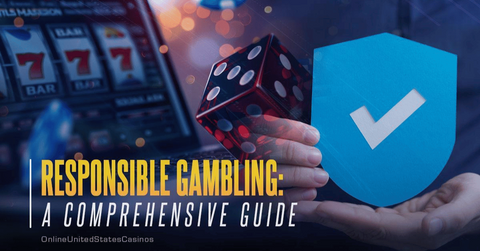Responsible Gambling: A Comprehensive Guide

Sept. 25 2024, Published 3:00 a.m. ET
You might have heard casinos ask players to gamble responsibly, but what does this really mean? Responsible gambling is when users play in a way that lessens the chances of potential negative gambling consequences. It involves players intentionally acting to avoid the pitfalls generally associated with problem gambling.
While online gambling has now become more accessible than ever, this makes it particularly important for both players and casinos to prioritize responsible playing. The National Council on Problem Gambling reported that around 85% of adults in the United States have gambled–with 60% of them doing so within the last year. This widespread participation has increased the urgency for responsible gambling initiatives, especially with the consideration that, as highlighted by QuitGamble.com, approximately 20 million Americans are either experiencing or at risk of developing gambling problems.
Problematic gambling not only affects the individual–it also has an effect on families, communities, and the economy. Warning signs to look out for include chasing losses, neglecting responsibilities, or hiding gambling habits.
This article seeks to offer valuable insights into responsible gambling, provide access to helpful tools and resources, and guide you on how to practice responsible gaming.
What is Responsible Gambling?
Responsible gambling means avoiding financial, emotional, or physical harm to yourself and those around you through gambling. Specifically, it suggests thinking of gambling solely as a form of entertainment (that is, not as a way to create income).
Players are not the only ones responsible for responsible gambling; casinos also play a crucial role. Online casinos are required to take proactive steps to prevent harm, as well as offer resources and support to help players recognize and address potential gambling issues.
On the other hand, players must make themselves aware of the signals of problem gambling and take the necessary steps to prevent this fun activity from becoming a problem for themselves and those around them. This involves a dual-step approach of education and action to avoid gambling harm.
Examples of responsible gambling behavior from online casinos include:
- Providing tools to help players control play.
- Conducting reality checks and periodic audits of player activity to identify problem gambling.
- Refrain from advertising or serving players already identified as problem gamblers or "at risk."
- Ensuring that all gaming and software adhere to regulatory guidelines and responsible gambling policies.
For players, responsible gambling includes:
- Gamble only with money that is designated for recreation.
- Setting limits on play, including time and deposit limits.
- Understanding the rules of the casino and casino games and the risks.
- Not chasing losses.
How to Gamble Responsibly
As noted above, responsible online gambling involves two steps. First, understand the risks that are involved in gambling, and then take measures to minimize those risks.
Learning about the basics of gambling and the way casino odds work is a good place to start. All casino games have a built-in house edge that can't be overcome in the long run. Yes, some players may get lucky and win. However, no strategy or system guarantees success over time.
Understanding the odds of each game will help you know your potential losses.
Next, understand the signs of problem gaming. Learn the symptoms of problem gambling–the psychological, financial, and even physical ones. Then, learn what to look for and evaluate your play, as this will help you catch potential problems before they become worse.
Learn to gamble responsibly by utilizing the various tools designed to help you set limits on your gameplay. Setting these limits can often be enough to prevent gambling from becoming a problem. If you're unsure about the tools your casino offers, check their responsible gambling page or reach out to customer support for guidance.
Most casinos will provide links and resources to help resources that you can reach out and contact. Compile a list to refer to at your convenience. You may also want to read the materials at the sites beforehand, as they can give you insight into spotting problem gambling.
Lastly, contact a friend or family member you trust regarding your gaming. Trusted friends and family can help you stay accountable and point out if your gambling is becoming a problem.
Responsible Gambling Tools
Many online casinos offer tools for players to control their gambling habits.
Responsible Gambling Tools
Players can set limits on their play at online casinos. These responsible gambling tools give you control over the aspects where players have the most problems in controlling their gambling. Here's a list of those tools.
Deposit Limits - You can limit how much you deposit at a casino. If you want to control your spending, daily limits are usually considered the best option.
Loss Limits - This controls how much you lose at a casino per session or day. You cannot continue playing once you hit this limit, forcing you to control spending.
Wager Limits - This controls how much you are allowed to bet. It does not consider wins or losses.
Session Limits - This sets time limits on how long you can play at the casino. After the limit is reached, you will be automatically logged out of the casino.
Cooling Off Periods - you can choose to not be allowed to log into the casino for a ser period of time. This is a short-term self-exclusion from the casino.
Self-Exclusion - this allows you to completely ban yourself from gambling online. This last resort option closes your account, and you cannot continue playing.
Other Tools and Help Resources
In addition to player tools, there are other options you can use to control your play.
Session and Game Tracking—Many casinos offer an option to request player history that covers all of your play. This lets you know everything from how long you play to how much you spend, giving you a better picture of your habits.
Support Groups and Helplines—Each casino typically offers a responsible gambling page with links to self-help resources and problem gambling helplines. If you feel that gambling is becoming a problem, consider using these resources.
Debunking Myths about Responsible Gambling
There are a lot of myths floating around about gambling and also about responsible gambling. It's important to dispel these rumors.
Myth or Fact? Gambling is Only a Problem if You Lose Everything
Some people mistakenly believe that you need to lose everything before you are truly a problem gambler. Others think you have to lose everything before getting help. This is untrue. Problem gambling is gambling that causes harm–and this can mean any form of harm.F
Many problem gamblers seek treatment before losing everything, and treatment can help players avoid financial ruin. So, if you're experiencing a problem, don't delay getting treatment.
Myth or fact? Using Limit-Setting Tools is a Sign of Someone Having a Problem with Their Gambling
Some people will not think about following responsible online gambling practices because of the stigma placed on problem gambling. They feel that practicing responsible gambling will make it look like they have a problem.
Responsible gambling can be thought like the other healthy habits people practice in their everyday life. Just like many people set budgets for activities like going to the movies or having drinks with friends, responsible gambling involves setting similar limits to manage spending. You're setting limits on your play to avoid problems and save money at the casino. If anything, it is smart money management.
Safe Gambling Practices
When people talk about safe gambling practices, they often focus on the actual act of gaming. However, gambling is more than pressing buttons, and responsible gambling involves considering everything surrounding the activity. Here are the three areas to consider when implementing safe gambling practices.
Environmental Practices
First, consider where you're gambling. Here are some things to think about:
- Don't gamble when distracted, such as around kids, your partner, or pets.
- Don't gamble while doing other activities, such as cooking or working.
- Don't gamble where you're uncomfortable, such as in a hot room or on uncomfortable furniture.
Physical Concerns
Your physical condition can significantly impact your decision-making and performance. Here are some physical considerations for safe gambling.
- Never gamble if you're lonely, upset, angry, or frustrated.
- Never gamble if you're intoxicated or under the influence of drugs or medications of any type.
- Don't gamble if you're hungry or tired.
- Don't gamble if you're in pain or experiencing physical discomfort.
Regulatory Concerns
Lastly, here are some legal concerns to consider before gambling.
- Check the local laws to ensure you're gambling on legal websites.
- If you're in a regulated state, research which casinos are licensed and regulated and only play there.
- Stay informed on your player rights and any options you have to address grievances, such as contacting a regulator.
New Perspective on Responsible Gambling

Responsible online gambling means taking active ownership of your gaming. This multi-step process includes all gaming areas, from picking the right site to setting limits on play.
Only play at licensed online casinos that do not have an extensive list of complaints lodged against them. This is important as rogue casinos often design casinos that restrict responsible gambling, such as not offering responsible gambling tools.
Next, immediately set limits on your play. Say you're a poker player, loss limits can be one of the best tools to control gambling. However, be sure to set limits that will ensure you stay in control.
"I've seen firsthand how quickly things can spiral out of control without setting firm limits. It's crucial to treat these limits as non-negotiable—just like wearing a seatbelt when driving." — James Guill, former semi-professional poker player.
Set your limits and stick to them religiously. The biggest problem with problem gamblers is that they don't stick to their limits and disciplines. Pretend that responsible gambling limits are necessary medicines that cannot be missed. That way, you are always in control of your gambling health.
Also, if you feel that gambling is causing a problem, don't wait to take action. One reason gamblers start using loss limits is that they underestimate how much they are losing during a losing streak. Once they uncover the problem, they can then take action and be in control of their losses.
It's important to integrate a responsible gambling routine into your play. It will reduce your losses and help you keep gambling fun and entertaining.
Final Thoughts
Responsible gambling means taking steps to make sure that gambling remains a form of entertainment. Actions include recognizing the risks associated with gambling and using tools and resources to prevent harm to yourself and others.
By understanding these risks and applying responsible gambling measures like time and wager limits, players can often avoid many of the common issues faced due to gambling. If you haven't yet implemented a responsible gambling strategy, now is the perfect time to start. Taking the appropriate actions now can help you keep gambling as it is intended—as entertainment. Please gamble responsibly.
The information provided in this article is for general informational purposes only. Gamble or play responsibly. If you or someone you know has a gambling problem, help is available. Call 1-800-GAMBLER. If you’re in the U.K. and need help with a gambling problem, call the National Gambling Helpline on 0808 8020 133 or go to gamstop.co.uk to be excluded from all UK-regulated gambling websites. We disclaim any liability for any loss or damage arising directly or indirectly from the use of, or reliance on, the information presented.


